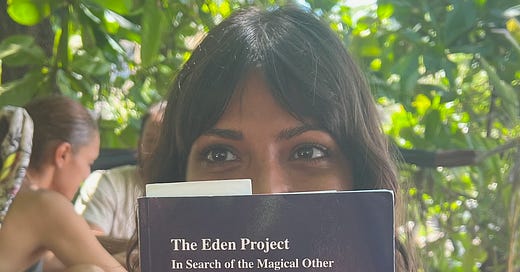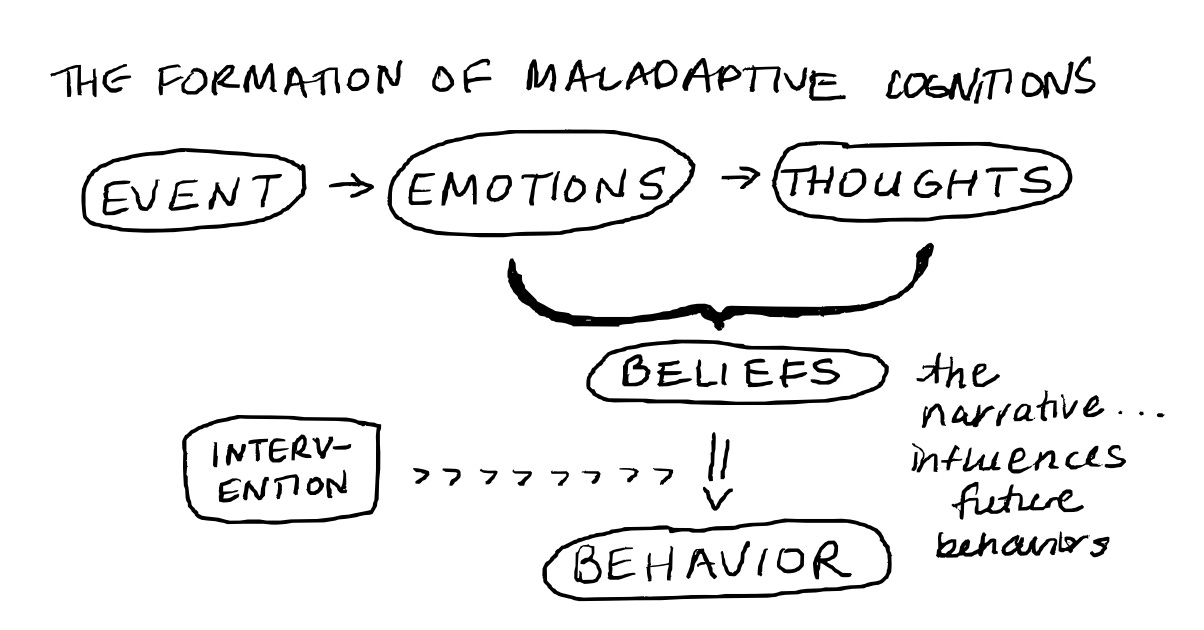It’s very buzzy to talk about the subconscious mind these days and as far as trends go, I’d say this is a pretty good one. As a self professed Carl Jung fangirl, I believe that everyone doing the work can only make the world a better place. Take, for example, the self-development app To Be Magnetic, founded by Lacy Phillips. It boasts 20,000+ annual subscribers, mostly young Millennial and Gen-Z women, all of whom are diving into ‘shadow work’ and ‘inner child healing’ as a precursor to manifesting their heart’s desires. Earlier this year, I met someone involved with Art of Accomplishment, another organization peddling personal development courses—this time marketed toward a more white-collar, straight-laced, and wealthy-crowd, with Fortune 500 logos splashed across their website. In a podcast series featuring the founders discussing relationships, they weave Jung’s theories into their conversation with little attribution. Jung’s ideas have become that ubiquitous, and it appears society’s take away is that when you self-reflect, all of your wildest dreams can come true.
Is it really so simple?
✾ ✾ ✾
In contrast to Jung’s mystic ideas, I found myself considering the prevalence of Cognitive Behavioral Therapy (CBT) this week. CBT is arguably the most widely prescribed therapeutic technique. What makes CBT controversial is that while it’s a staple in the mental health field, many people with even a surface-level interest in new-age ideas tend to view it as shallow, reductive, and even harmful for certain client populations. While I don’t think it’s the ultimate solution, CBT offers a helpful framework for understanding where our maladaptive behaviors, or shadows1, originate—a blueprint for why people often make choices that, from the outside looking in, seem so obviously wrong.
An event occurs. Let’s say it’s a break up. You are heartbroken, and you have a fearful thought, “Will I ever get married?”
You get trapped in a cycle of sadness and Will I Evers, and the next thing you know, the “Will I-…” has transformed into “I will-” I will never get married. I will never have kids. I will never get what I want. I never get what I want.
Your friends all wonder why you find yourself in toxic relational dynamics, and it’s because such relationships confirm the narrative that they originate from.
To be clear, this is all a gross over-simplification of the human psyche. Indeed, CBT’s fatal flaw is that it does grossly over-simplify people. We are not robots, and if people could intellectualize themselves out of maladaptive behavior, in this world full of chronic over-thinkers, we all would have figured it out already.
Still, it’s undeniable that we often see the world through the damaging filter of our negative beliefs. This is usually happening on a subconscious level. Consider, too, that our cognitions all form a complex web of interconnected beliefs that are all impacting one another, and untangling them is our lifelong task. So how do we begin?
✾ ✾ ✾
Facing the darkness within our own minds is both one of the most rewarding, and terrifying, experiences—and it’s something we often shy away from. This theme is a common trope in fantasy novels. Take the archetype2 of the mirror3. In Harry Potter and the Sorcerer’s Stone, Harry encounters the Mirror of Eresid, which shows him an impossible reality—his dead family surrounding him. Obsessed with this unattainable vision, Harry seeks the mirror out night after night, risking expulsion from Hogwarts, the new home with his ‘found’ family he has only just landed in. Similarly, in the A Court of Thorn and Roses series, the protagonist Feyre faces the Ouroboros, a mirror that reveals the true Self4. Legend has it that no one has survived this encounter because the reality of who they are drives most people mad.
As poignant as these stories are, I would argue we don’t need a fantastical mirror to face the darkness and light within us. In a recent conversation with two friends, J & J, we discussed how whatever we’re naturally drawn to can be a wonderful tool for self-discovery. Whether it’s cooking, meditation, journaling, or a movement practice, any of these activities can be revelatory. To use Jung’s language, they can help us make the subconscious conscious. How? Because mastery of anything requires repetition, and repetition forces us to face what we’d rather distract ourselves from. But medium matters—when we love what we’re doing, distraction becomes less appealing.
Because I’m obsessed with learning basketball these days, I followed several basketball coaches on Instagram. And a big takeaway is that if you want an amazing shot in basketball, there’s no secret recipe. Just shoot—shoot every single day. If you want to change your beliefs, it’s the same idea. But whether it’s basketball or rewiring maladaptive patterns, you’re going to miss and, and maybe you’ll miss six shots in a row. To quote Jungian analyst James Hollis, “What courage it takes to pursue such repeated humbling.”5 But when you want to give up, that’s when you’ve found the shadow you need to confront.
It took us multiple decades to form the negative thoughts we employ for our self-flagellation, so breaking the habit may take just as long. We need stillness and a little time, a journal and a pen, a challenging hobby, maybe a good therapist to bounce ideas off of, who can help us organize our thoughts and learn the language of our soma.
But outside of spending 10,000 hours learning an instrument, language, or sport, going to annual spirituality retreats and breathwork classes, or asking AI for Jungian dream analyses, perhaps the easiest and most accessible intervention we can practice is self-reflection. Just like there’s no magic pill that improves your basketball shot, there’s no secret to building self-awareness outside of lots and lots of reps. And just like basketball, I do believe it is a skill we can develop. Our lives and our Selves are not something that are happening to us. Certain people aren’t simply born with more self-awareness than others. It’s a practice. We are not just the willing participants, but the drivers of our circumstances, and we are always making choices. As Jung says, “Until you make the unconscious conscious, it will rule your life and you will call it fate.”
The irony of repetition is that we suffer a humbling either way, but we can choose the type of suffering we endure. When I was a heavy drinker, I was still the same person at my core—an extrovert who deeply loves people, connection, and community. Back then, it was my belief that the easiest, maybe even the only, way to access the feeling of connectedness I craved was through alcohol. The result? Momentary, shallow connection, sure… along with a super-sized hangover and a side of poor decisions in dating, health, and fitness. This all eroded my faith in myself, which was ironically the most isolating feeling of all, and drove me to try for connection again, and be humbled again, and again, and again, in a vicious cycle.
✾ ✾ ✾
Recently I went to a silent disco in the park.6 This is the third one I’ve attended this month; I find them so cathartic. I love dancing. I love intuitive movement. Back in my drinking days, I had to take a tequila shot to give myself permission to dance. Now, I get to give myself permission to enjoy what I love rather than relying on some external force, which is incredibly empowering. I took my friend C with me. He has recently stopped smoking weed after 10+ years as a daily smoker. He didn’t realize a silent disco involved dancing when he signed up. I remember him telling me once that his mom used to josh him as a kid and tell him he had no rhythm. But he’s one of the most embodied individuals I’ve met, so I knew access to intuitive movement was simmering inside him.
I saw fear cross his eyes when he realized what he had signed himself up for, and then I watched him do all of the things that felt more instinctive to him instead, from walking to his car to get his sweatshirt, to sitting down and closing his eyes, to finding some random guys to toss a football around with. But eventually, he began to participate. It brought tears to my eyes to witness the childlike joy and playfulness that I adore in him emerge in this unfamiliar environment, as he began first to walk, and then wiggle, and by the end jump and run in a circle with the group to Rihanna’s “We Found Love.” For everyone there, it was a moment of pure, unadulterated, childlike joy, and I can only think to describe the collective feeling as glee.
Simultaneously, I got to practice not sacrificing my own experience to help him regulate and ensure his comfort. My tears were for him as much as they were for the pride I felt in myself ceding the fawn response in favor of focusing on the only thing I was accountable for in that moment: taking care of myself. Afterwards, as we sat in the grass, leaning against each other, swaying to the final song playing in our headphones in time with the wind, the word that came to mind was ‘freedom.’
Synchronistically, A sent me a Viktor Frankl quote the next morning. She always seems to know exactly what I need to hear, without me having to ask:
I love that as humans we get to practice being the best versions of ourselves. If we don’t tackle making our subconscious conscious with joyful curiosity, what we are really sacrificing is our very humanity. We cannot truly be free without doing this work. And how lucky are we that we get to be consciously aware of ourselves? It is a mysterious, magical, fantastical, miracle, better than any fantasy novel.
I’m not saying any of this is easy. Arguably it is the hardest thing we do—and so it is the most important.
What is the cost of not trying? Personally, I prefer not to view myself as an NPC in my own life. The more I view it as a gift that I get to unravel the mystery of my own mind, the more grateful I feel for all my aliveness. Getting started just requires showing up and participating in the ecstatic dance of our existence, taking accountability for what is within our control, and engaging with this work with a sense of playfulness.
✾ ✾ ✾
Because I love a good framework, I’ll leave you with a web of questions to ask yourself when it feels like life is happening to you, rather than for you.
My hope is that we can all approach self-reflection with curiosity, accountability, and playfulness when the Event is joyous, but especially when the Event hurts.
In Jungian psychology, the shadow is an archetype that the unconscious part of the personality, characterized by both positive and negative traits and attitudes, which our conscious mind tends to ignore.
In Jungian psychology, archetypes are universal patterns or motifs.
In Jungian psychology, the mirror is a symbol for self-reflection and self-awareness; often symbolizes the process of coming face-to-face with our shadows.
In Jungian psychology, the capital-S Self signifies the archetype of the whole of the psyche; the marriage of the unconscious and conscious minds.
From Hollis’s The Eden Project, pg. 31.
Can’t think of a more Austin, Texas activity. :-)







